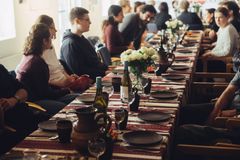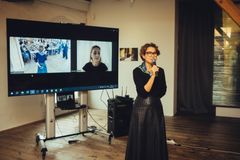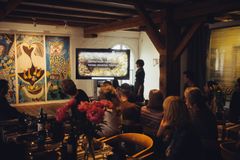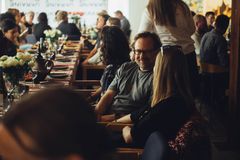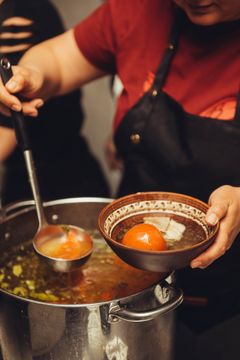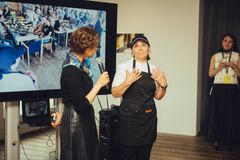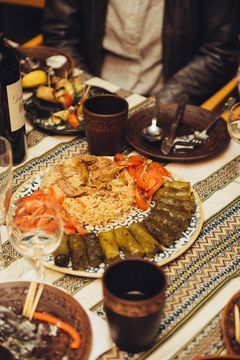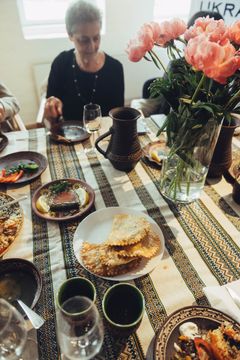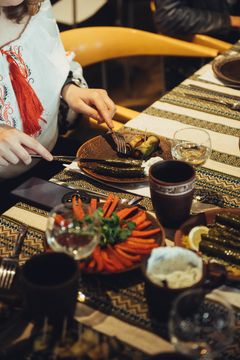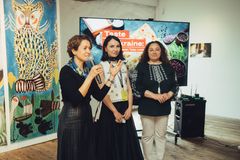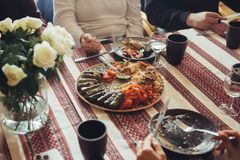“Taste of Ukraine”: An Evening of Remembrance and Solidarity with the Crimean Tatar People
On May 25, Ukraine House in Denmark hosted a special edition of its series “Taste of Ukraine”, dedicated to the Crimean Tatar people—their history, their struggle, and their resilient identity. The event took place in the shadow of May 18 which marks the deportation of Crimean Tatars by the Soviet regime in 1944, a historical trauma that continues to shape the destiny and identity of Ukraine’s indigenous people.
More than a dinner, the evening became a space of communal remembrance, a moment to pause and confront the long history of oppression and reflect on the enduring fight for identity and belonging.
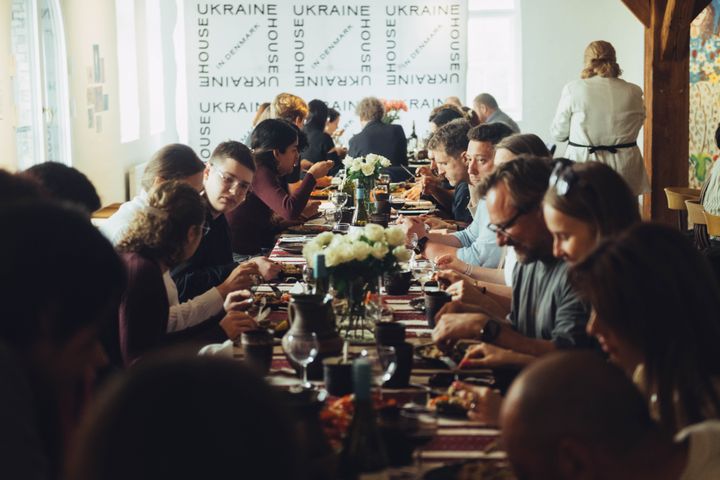
The deportation of 1944 was more than an episode of forced relocation—it was an act of cultural and physical erasure, a genocide. During the event, participants heard reflections on this historical trauma and its intergenerational impact offered by Gulnara Abdulayeva, a Crimean Tatar historian and author. She talked about her people not just as an academic subject but as a living memory carried by families, passed through silence, stories, and survival:
“There wasn’t a single Crimean Tatar family that wasn’t affected by the deportation. Even in my own family—just women—survived however they could. This wasn't just history. It’s a living wound passed from generation to generation.”
Entire families were uprooted from their homeland in Crimea, given minutes to gather their belongings, and transported in cattle cars to unfamiliar lands in Central Asia. Nearly half of those deported perished due to hunger, disease, and the brutal conditions of exile. This was not only a tragedy for a people, but a wound to Ukrainian history itself—one that still bleeds today under Russia’s ongoing occupation of Crimea, and the repression of Crimean Tatars who remain on the peninsula.
“The Soviet deportation of the Crimean Tatars was carried out under the false pretext that an entire people had betrayed the Soviet Union. As a result, all Crimean Tatars—including women, children, and the elderly—were collectively punished, exiled from their homeland, and forced to live for decades under a stigma of treason. They endured systemic discrimination and social exclusion simply for being who they were ethnically and culturally. What’s especially striking today is that even many of the most liberal Russians remain unwilling to confront the legacy of these crimes. They refuse to acknowledge the injustice of Soviet-era atrocities or to accept any sense of collective responsibility for the wars of aggression launched by Russian leadership in the past and present,” says Nataliia Popovych, chairperson of Ukraine House in Denmark.
An important moment of the evening was paying tribute to the Crimean Tatar dissidents, including Mustafa Dzhemilev, a symbol of non-violent resistance, moral courage, and the Crimean Tatar national movement. From his youth, Dzhemilev resisted Soviet lies and fought for the right of his people to return to their homeland—facing imprisonment, surveillance, and exile in the process.
His example is not only part of Crimean Tatar history, but of the broader Ukrainian narrative—a testament to the power of principle in the face of empire. His story served as a reminder that the fight for dignity can persist across borders, generations, and political systems.
In 1991, the Crimean Tatars re-established their national assembly, the Kurultai, and elected the Mejlis, their representative body. That same year, they made a choice that remains fundamental: “The Crimean Tatars decided to be part of an independent Ukraine. Because the Crimean Tatars know their history very well and they remembered very well our common history with Ukraine, which lasted for more than three hundred years, and we lived next to each other and had a lot in common. Crimea is a part of Ukraine.” (Gulnara Abdulayeva)
Though food was served, it was not the focus but tools that preserve Crimean Tatar identity. Dishes such as shurpa, veal pilaf, dolma, chibereki, mercimek and fultu were edible stories—reminders of lost kitchens, recovered traditions, and the strength to preserve a culture in exile.
Two chefs from the celebrated Musafir restaurant in Kyiv, Zemfira and Tetyana, who traveled to Copenhagen for the event, brought more than just food and their talent, but the memory of home, the language of heritage, and the sensory expression of continuity of Crimean Tatar culture of hospitality, where every guest is a dear guest. We thank them for sharing their national cuisine and its unique flavors with us.
During the evening, Gulnara Abdulayeva also touched on the current challenges faced by Crimean Tatars (and also Ukrainians) under Russian occupation:
“Today, there are many political prisoners in Crimea—Ukrainians and Crimean Tatars alike. But disproportionately, it is the Crimean Tatars who suffer. We are still fighting. We remain in our homeland, asserting our right to exist. And despite 11 years of occupation, Crimea is still waiting for Ukraine.”
Repression, disappearances, imprisonment, and the criminalization of cultural and religious identity remain daily realities for those under occupation.
This edition of “Taste of Ukraine” proved once again that cultural events are not peripheral—they are central to national memory, identity, and diplomacy. The evening served as a reminder that history lives on in the voices of those who remember and the actions of those who resist. As Ukraine continues its struggle for liberation and justice, events like these help ensure that the stories of indigenous peoples like the Crimean Tatars are heard and never forgotten.
Images
About Ukraine House
The Ukraine House in Denmark is a civil society organisation of Ukrainian cultural diplomacy based in Copenhagen. Its mission is to form an enduring positive influence of Ukraine on Ukrainian-Danish cooperation, security, and lasting peace in Europe.
Subscribe to releases from Ukraine House in Denmark
Subscribe to all the latest releases from Ukraine House in Denmark by registering your e-mail address below. You can unsubscribe at any time.
Latest releases from Ukraine House in Denmark
Ukraine House i Danmark afholder debat om afslutningen på russisk kolonialisme21.10.2025 14:55:47 CEST | Pressemeddelelse
København, 22. september 2025 – Ukraine House i Danmark afholdt i samarbejde med Udenrigspolitisk Selskab og Free Nations of Post-Russia Forum en paneldebat om afslutningen på russisk kolonialisme. Arrangementet samlede internationale eksperter, beslutningstagere og ledelsesrepræsentanter for civilsamfundet til en drøftelse af Ruslands imperiale tilbagegang og nødvendigheden af at forberede sig på dens konsekvenser. Debatten blev modereret af Nataliia Popovych, formand for Ukraine House i Danmark, og panelet bestod af Charlotte Flindt Pedersen (Udenrigspolitisk Selskab), Jacob Kaarsbo (analytiker i efterretnings- og sikkerhedspolitik), Juraj Mesík (Slovakisk Udenrigspolitisk Selskab), Yaroslav Yurchyshyn (medlem af det ukrainske parlament), Oleg Magaletskyi (Free Nations of Post-Russia Forum) og Mette Skak (forsker i russisk udenrigs- og sikkerhedspolitik).
Post-Release: Myroslav Marynovych om mod, samvittighed og konfrontationen med nutidens Rusland6.10.2025 10:45:03 CEST | Pressemeddelelse
København, Danmark – Den 5. september havde Ukraine House i Danmark den ære at være vært forMyroslav Marynovych, en vigtig dissident, medstifter af den Ukrainske Helsingforsgruppe, Gulag-overlever og prorektor ved det Ukrainske Katolske Universitet. Arrangementet kastede lys over modet hos Ukraines menneskerettighedsforkæmpere i 1960’erne og 70’erne – en generation, der modsatte sig den sovjetiske totalitære maskine, på et tidspunkt hvor næsten ingen troede, det var muligt.
Ukraine House in Denmark Hosts Debate on the End of Russian Colonialism1.10.2025 08:00:00 CEST | Pressemeddelelse
Copenhagen, September 22, 2025 — Ukraine House in Denmark, together with the Danish Foreign Policy Society and the Free Nations of Post-Russia Forum, convened a high-level discussion on the end of Russian colonialism. The event brought together international experts, policymakers, and civil society leaders to examine Russia’s imperial decline and the urgent need to prepare for its consequences. Moderated by Nataliia Popovych, Chairperson of Ukraine House in Denmark, the panel featured Charlotte Flindt Pedersen (Danish Foreign Policy Society), Jacob Kaarsbo (Intelligence and Security Analyst), Juraj Mesík (Slovak Foreign Policy Association), Yaroslav Yurchyshyn (Member of the Ukrainian Parliament), Oleg Magaletskyi (Free Nations of Post-Russia Forum), and Mette Skak (Scholar on Russian foreign and security policy).
Post-Release: Myroslav Marynovych on Courage, Conscience, and Confronting Today’s Russia30.9.2025 14:09:02 CEST | Pressemeddelelse
Copenhagen, Denmark – On 5 September, Ukraine House in Denmark was honored to host Myroslav Marynovych, a keystone dissident, co-founder of the Ukrainian Helsinki Group, Gulag survivor, and Vice-Rector of the Ukrainian Catholic University. The event shone a light on the courage of Ukraine’s human rights defenders in the 1960s and 70s, a generation that resisted the Soviet totalitarian machine when almost no one believed it was possible.
How Ukraine’s Da Vinci Wolves Are Rewriting the Rules of War: Military Tech Discussion at Ukraine House in Denmark9.9.2025 08:00:00 CEST | Pressemeddelelse
Copenhagen, Denmark — August 22, 2025. At Ukraine House in Denmark, soldiers, engineers, and policymakers gathered to share the lessons of a war where milltech drones and robots, and artificial intelligence have moved from theory to daily reality in Ukraine. Organized by the Defence Robotics, a charity foundation, the discussion brought together Oleksandr Yabchanka, Head of the Robotic Systems Service of the Da Vinci Wolves battalion, alongside innovators from companies Frontline and Tencore, two of Ukraine’s leading developers of ground robotic platforms.
In our pressroom you can read all our latest releases, find our press contacts, images, documents and other relevant information about us.
Visit our pressroom
